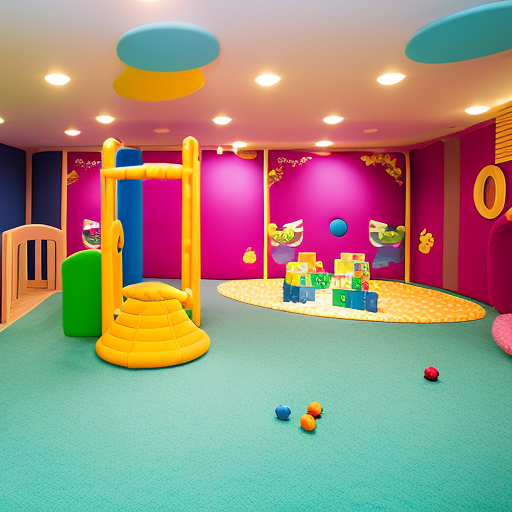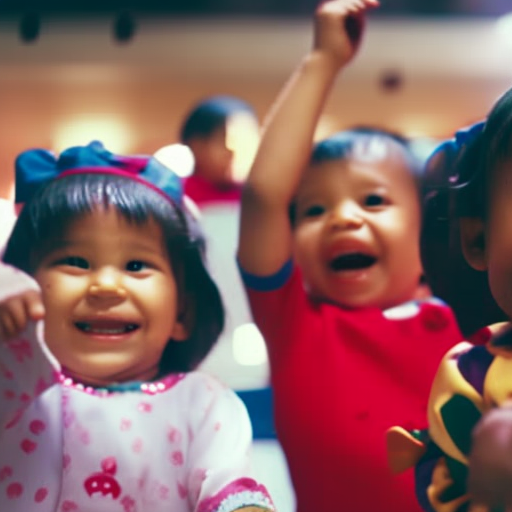"Cherishing Little Steps - A Haven for Baby and Family Journeys"
Encouraging Social Play for Infants
Imagine the joy on your infant’s face as they giggle, reach out, and interact with others. Encouraging social play in infants is not only a delightful sight but also crucial for their development.
But how can you foster this essential skill in your little one? In this discussion, we will explore the importance of social play, different types of social play, the benefits it brings to infants, and practical strategies to create a safe and nurturing environment for social interaction.
So, let’s dive in and discover the wonders of social play for your little one.
Key Takeaways
- Social play is crucial for infants as it fosters cognitive, emotional, and social development.
- Creating a safe environment for social play involves providing age-appropriate toys, supervision, and clear guidelines.
- Playful activities such as playdates, music and movement, storytime, and interactive toys can encourage social interaction.
- Encouraging peer interaction through playdates, parent-child classes, playground visits, and playgroups can promote social development and peer bonding.
The Importance of Social Play

Social play is crucial for infants as it fosters their cognitive, emotional, and social development in a fun and interactive way. Early socialization plays a significant role in shaping a child’s future. Engaging in social play at an early age helps infants develop important skills that lay the foundation for their cognitive development.
When infants engage in social play, they learn to communicate, cooperate, and problem-solve. Through interactions with their peers and caregivers, they develop language skills, spatial awareness, and the ability to understand and interpret social cues. These skills are essential for their cognitive development as they provide the building blocks for more complex thinking and reasoning later in life.
Research has shown that infants who engage in social play have higher levels of cognitive functioning compared to those who do not. By playing with others, infants are exposed to new ideas, perspectives, and experiences. This exposure stimulates their brain development and enhances their ability to think critically and creatively.
Furthermore, social play provides infants with opportunities to practice their social skills and develop emotional intelligence. They learn to take turns, share, and empathize with others, which lays the groundwork for healthy relationships and effective communication in the future.
Types of Social Play

During infancy, there are various types of play that promote social interaction and contribute to a child’s overall development. Engaging in social play not only helps infants build relationships with others, but it also enhances their cognitive, emotional, and physical development. Let’s take a closer look at some of the different types of social play that are beneficial for infants.
| Type of Social Play | Description | Benefits |
|---|---|---|
| Parallel Play | Infants play beside each other without direct interaction. They may imitate each other’s actions but do not actively engage with one another. | Develops social awareness and observational skills. |
| Cooperative Play | Infants actively engage with each other, sharing toys, and taking turns. They may collaborate in building or pretend play. | Enhances communication, problem-solving, and cooperation skills. |
| Sensory Play | Infants explore their senses through interactive toys and materials, such as water, sand, or playdough. Parents can join in and provide sensory experiences. | Stimulates cognitive, motor, and sensory development. |
| Peekaboo | A classic game where parents hide and reappear, teaching infants about object permanence and promoting laughter and bonding. | Enhances cognitive development and strengthens parent-child bonding. |
Benefits of Social Play for Infants

As infants engage in different types of social play, they not only build relationships and interact with others, but they also reap a multitude of developmental benefits. Social play is crucial for their overall growth and development, including cognitive development. Here are some of the benefits that social play can provide for infants:
-
Enhanced problem-solving skills: Through social play, infants learn to navigate different situations and solve problems. They develop critical thinking skills as they interact with others, negotiate, and find solutions together.
-
Improved language development: Social play provides infants with opportunities to engage in conversation, listen to others, and practice their language skills. They learn to communicate effectively and understand verbal and nonverbal cues.
-
Increased creativity and imagination: Playing with others sparks infants’ imagination and encourages them to think creatively. They engage in pretend play, take on different roles, and explore new ideas.
-
Strengthened social and emotional skills: Social play helps infants develop empathy, cooperation, and emotional regulation. They learn to take turns, share, and understand the feelings of others.
Creating a Safe Environment for Social Play

To ensure a safe and nurturing environment for social play, it is essential to create a space that encourages exploration, collaboration, and positive interactions among infants. By implementing safety measures and setting appropriate boundaries, you can create an environment where infants can freely engage in social play without compromising their well-being.
Here are some key safety measures to consider when creating a safe environment for social play:
| Safety Measures | Description |
|---|---|
| Soft Surfaces | Ensure that the play area has soft surfaces, such as foam mats or rugs, to cushion falls and reduce the risk of injury. |
| Age-Appropriate Toys | Provide toys that are specifically designed for infants and are free from small parts or choking hazards. Regularly inspect toys for any damage or wear and tear. |
| Supervision | Always supervise infants during social play to prevent accidents and address any potential conflicts or issues that may arise. |
Setting boundaries is equally important in maintaining a safe environment for social play. Establishing clear guidelines and limits helps infants understand what is acceptable behavior and promotes positive interactions. For example, encourage gentle touching and discourage aggressive behavior.
Playful Activities to Encourage Social Interaction

Engage your infant in playful activities that foster social interaction and encourage their development in a fun and interactive way. Group play is a fantastic way for your little one to learn important social skills and build relationships with their peers.
Here are four playful activities that promote social interaction:
-
Playdates: Arrange playdates with other parents and their infants. This allows your baby to interact with others in a playful and safe environment. Encourage sharing and turn-taking during playtime to enhance their social skills.
-
Music and movement: Join a parent and baby music class or create your own at home. Singing and dancing together not only strengthen the bond between you and your infant but also provide opportunities for social interaction with other families.
-
Storytime: Attend group storytime sessions at your local library or organize one with friends. Engage in interactive storytelling by using puppets or props, and encourage your baby to interact with others by clapping, pointing, or imitating sounds and actions.
-
Interactive toys: Choose toys that promote social interaction, such as stacking blocks or ball drop toys. These encourage cooperation, turn-taking, and sharing as infants play together.
Building Social Skills Through Play

By incorporating play into your infant’s daily routine, you can help them build essential social skills that will benefit them throughout their lives.
Play isn’t just about having fun; it’s a powerful tool for building friendships and developing communication skills.
When infants engage in social play, they learn how to interact with others, take turns, and share. These skills are crucial for building relationships and navigating social situations later in life.
Through play, infants also learn how to express their thoughts and feelings, understand the emotions of others, and communicate effectively.
Research has shown that infants who engage in social play have better social skills and are more likely to form positive relationships with their peers. They learn important social cues, such as reading facial expressions and body language, which are essential for understanding and responding to others.
To help your infant build social skills through play, you can encourage them to play with other children, provide opportunities for cooperative play, and model positive social behaviors yourself. It’s also important to create a safe and supportive environment where your infant feels comfortable exploring and interacting with others.
Encouraging Peer Interaction in Social Play

Encouraging infants to interact with their peers in social play is a valuable way to foster their social development and enhance their communication skills. Peer interaction allows infants to learn from one another, develop important social bonds, and practice important skills for future relationships.
Here are four ways you can encourage peer interaction in social play:
-
Arrange playdates: Organize playdates with other parents and their infants. This provides an opportunity for your child to interact with their peers in a controlled and safe environment.
-
Join parent-child classes: Enroll in parent-child classes, such as music or movement classes, where infants can interact with their peers while engaging in fun activities.
-
Visit playgrounds: Take your child to local playgrounds where they can interact with other children. This informal setting allows for spontaneous social interactions and the opportunity for peer bonding.
-
Attend playgroups: Join local playgroups that bring together parents and infants for structured play sessions. Playgroups provide a supportive environment for infants to engage in social play while also allowing parents to connect with one another.
Encouraging peer interaction in social play is crucial for infants’ social development and peer bonding. By providing opportunities for your child to interact with their peers, you’re helping them develop important social skills that will benefit them throughout their lives.
Tips for Nurturing Social Play at Home

To promote social play at home, you can incorporate simple activities that encourage interaction and cooperation between your infant and their siblings or playmates. Nurturing social bonding and developing communication skills in your little one is crucial for their overall development. By providing opportunities for social play, you’re helping them build important social skills that will benefit them throughout their lives.
One way to nurture social play is by setting up playdates with other infants or toddlers. This allows your child to interact with their peers, learn to take turns, share toys, and communicate their needs and wants. Encourage cooperative play by providing toys or games that require teamwork, such as building blocks or puzzles. This will help your child learn to collaborate, problem-solve, and take on different roles.
Engaging in pretend play is another effective way to foster social play at home. Encourage your child to use their imagination and engage in role-playing activities with their siblings or playmates. This type of play promotes creativity, empathy, and communication as they take on different characters and interact with others.
Reading books together isn’t only a great bonding activity, but it also helps develop communication skills. Use books with colorful illustrations and simple stories that encourage interaction, such as asking your child questions about the characters or the plot. This will enhance their language skills and their ability to engage in conversations.
Incorporating these simple activities into your daily routine can have a significant impact on nurturing social bonding and developing communication skills in your infant. Remember, play isn’t just about having fun, but also about learning valuable life skills. So, make time for social play and watch your child thrive.
Frequently Asked Questions
How Can I Encourage Social Play for Infants With Special Needs?
You can encourage social play for infants with special needs by using play therapy. Social interaction has many benefits for these infants, such as improved communication skills and emotional development.
What Are Some Common Challenges Parents Face When Trying to Encourage Social Play in Infants?
Encouraging social play in infants can be challenging. Common challenges include limited attention span, difficulty sharing, and lack of social skills. However, with strategies like modeling, turn-taking, and providing opportunities for interaction, parents can foster social play in their little ones.
Are There Any Specific Toys or Materials That Are Recommended for Promoting Social Play in Infants?
To encourage social play in infants, there are specific toys and materials that can help. These toys promote interaction, communication, and cooperation, which are all important benefits of social play.
How Can I Handle Conflicts or Disagreements That May Arise During Social Play?
When conflicts arise during social play, remember to stay calm and model effective conflict resolution strategies. Encourage empathy by helping infants understand each other’s feelings and find solutions together.
Is There an Ideal Age or Developmental Stage for Introducing Social Play to Infants?
There isn’t an ideal age for introducing social play to infants, but research shows that it can have numerous benefits. It helps develop communication skills, promotes emotional intelligence, and fosters social connections that last a lifetime.
Conclusion
So, there you have it! Encouraging social play for infants isn’t only beneficial for their development but also a great way to have some fun together.
From creating a safe environment to engaging in playful activities, you can help your little one build important social skills.
And remember, peer interaction is key, so make sure to nurture social play at home.
So, grab those toys, gather some friends, and let the social playtime begin!


